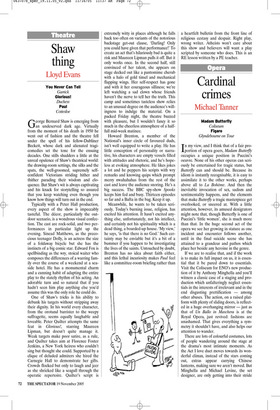Shaw thing
Lloyd Evans
You Never Can Tell Garrick Glorious! Duchess Paul Cottesloe George Bernard Shaw is emerging from an undeserved dark age. Virtually from the moment of his death in 1950 he went out of fashion and the theatre fell under the spell of his fellow-Dubliner Beckett, whose dark and alienated tragicomedies set the tone for the ensuing decades. One stills shudders a little at the unreal opulence of Shaw’s theatrical world: the drawing-room settings, the silks and the spats, the well-groomed, supremely selfconfident Victorians striding hither and thither parading their wisdom and eloquence. But Shaw’s wit is always captivating and his knack for storytelling so assured that you keep watching even though you know how things will turn out in the end.
Typically with a Peter Hall production, every aspect of the show is impeccably tasteful. The décor, particularly the outdoor scenario, is a wondrous visual confection. The cast are rock-solid, and two performances in particular light up the evening. Sinead Matthews, as the precocious teenager Dolly, is an actress the size of a foldaway bicycle but she has the instincts of a big comic star. Edward Fox is spellbinding as the wry, stoical waiter who composes the differences of a warring family over the course of a weekend at a seaside hotel. He has a monumental charm and a cunning habit of adapting the entire play to the stately rhythm of his acting. An adorable turn and so natural that if you hadn’t seen him play anything else you’d assume this was the only role he could do.
One of Shaw’s tricks is his ability to debunk his targets without stripping away their dignity. In his world every character, from the orotund barrister to the weepy suffragette, seems equally laughable and loveable. Peter Quilter attempts the same feat in Glorious!, starring Maureen Lipman, but doesn’t quite manage it. Weak targets make poor satire, as a rule, and Quilter takes aim at Florence Foster Jenkins, a New York heiress who couldn’t sing but thought she could. Supported by a clique of deluded admirers she hired the Carnegie Hall to demonstrate her gifts. Crowds flocked but only to laugh and jeer as she shrieked like a seagull through the operatic repertoire. Quilter’s script is extremely witty in places although he falls back too often on variants of the notorious backstage get-out clause, ‘Darling! Only you could have given that performance!’ To create an act that’s hilariously bad is quite a risk and Maureen Lipman pulls it off. But it only works once. In the second half, still convinced of her talent, she appears on stage decked out like a pantomime cherub with a halo of gold tinsel and mechanical flapping wings. Her self-respect has gone and with it her courageous silliness; we’re left watching a sad clown whose friends haven’t the nerve to tell her the truth. This camp and sometimes tasteless show relies to an unusual degree on the audience’s willingness to indulge the material. On a packed Friday night, the theatre buzzed with pleasure, but I wouldn’t fancy it so much in the cheerless atmosphere of a halffull mid-week matinee.
Howard Brenton, a member of the National’s inner circle of favoured duds, isn’t well equipped to write a play. He has little conception of personality or narrative, his characters are empty vessels filled with attitudes and rhetoric, and he’s hopeless at evoking atmosphere. He likes jokes a lot and he peppers his scripts with wry remarks and knowing quips which prompt merry nwahahahas from the rest of the cast and leave the audience snoring. He’s a big success. The BBC spy-show Spooks keeps him fed and busy. Thirteen episodes so far and a Bafta in the bag. Keep it up.
Meanwhile, he wants to be taken seriously. Today’s burning issue, religion, has excited his attention. It hasn’t excited anything else, unfortunately, not his intellect, and certainly not his spirituality which is a dead thing, a boarded-up house. ‘My view,’ he says, ‘is that there is no God.’ Such certainty may be enviable but it’s a bit of a bummer if you happen to be investigating the lives of the saints. Untouched by doubt, Brenton has no idea about faith either, and this lethal incuriosity makes Paul feel like a committee-room briefing rather than a heartfelt bulletin from the front line of religious ecstasy and despair. Right play, wrong writer. Atheists won’t care about this show and believers will want a play scripted by someone who does. This is an RE lesson written by a PE teacher.

























































 Previous page
Previous page